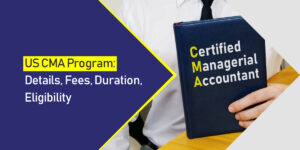Top 5 Reasons to Become an Enrolled Agent:

EA stands for Enrolled Agent. EAs are usually tax practitioners who are authorized federally in the areas of taxation. EA’s main role will be to represent the taxpayers before the IRS, a United States Federal Agency responsible for the collection of taxes, and look over the proper enforcement of tax laws in the country.
Enrolled Agents get their license to practice from IRS (Internal Revenue Service). Enrolled Agent is the highest title so far given by IRS with recognition in over 50 states in the US.
EA is one of the most promising credentials for anyone who wants to form a career in the tax field. EA can open doors to unlimited opportunities in tax domain.
Enrolled Agents is the only credential that comes with the right to practice from United States Government directly. Other credentials like Attorney, Certified Public Accountant (CPA) do not have the federal license that the Enrolled Agent holds.
Attorneys and CPAs (Certified Public Accountants) will have a state license and have the right to practice in a particular state where they are issued a license. Enrolled Agents will have the right to unlimited practice issued by the IRS with the ability to practice in any state of the United States.
Enrolled Agents can represent taxpayers in any state in the US before the eyes of the IRS with similar job roles to Attorneys and CPAs (Certified Public Accountants). Enrolled Agents’ job roles go beyond just representing taxpayers and preparing their tax returns. Let us dive into the job roles of Enrolled Agents.
Job Role of an Enrolled Agent (EA)
- Enrolled Agents provide tax bits of advice to their clients and also help with following the tax laws in their states.
- Enrolled Agents speak for their clients on matters of audit and appeals before the Internal Revenue Service (IRS).
- EAs are the tax experts who are engaged in filing tax returns not just for individuals but also for trusts, estates, corporations, and all entities with tax reporting needs.
You might have gained an idea of how elite the role of an Enrolled Agent is and how valued It is. So let’s double up your motivation even further by learning why you must look into the career of an Enrolled Agent.
Contents
Top 5 Reasons to Become an Enrolled Agent:
Verified Tax expertise by IRS:
Job Security that is Recession Proof:
Certification with Minimal Requirements:
Unlimited Tax Representation Rights:
High Salary and Better Earning Potential:
Verified Tax Expertise by IRS:

Passing your Enrolled Agent exam and earning an EA’s federal license makes you a part of the elite group of tax accountants that are recognized as tax experts throughout the country.
In general EA certification means that the professional holds a high level of knowledge and expertise in the field of tax.
IRS (Internal Revenue Service) has very strict standards and regulations when it comes to selecting an Enrolled Agent. These high standards maintained by IRS show everyone the level of skill and knowledge an Enrolled Agent with a federal license issued by the IRS brings to the table.
EA’s knowledge is not just limited to a particular state in the US, as the credential is regulated by the Department of Treasury.

An Enrolled Agent is valued and revered in each and every state of the United States.
IRS constantly updates and changes the tax codes and rules of states based on the political climate and changing times and situations throughout the country of the United States. Enrolled agents will be on the list of the IRS to receive tax updates as their main task is to work every day as tax practitioners. With a federal license, EAs will already have their spot saved on the database of a list of certified practitioners. But the Attorneys and CPAs (Certified Public Accountants) with a state license will have to take a refresher course in order to get updated about the changing tax laws and regulations.
Job Security that is Recession Proof:

Tax and Death are two certain things in our lives irrespective of economy, as we all know. Filing tax returns and paying taxes on time are two things that are to be done by the entire earning population on this planet irrespective of the political, climate, and economic changes, which makes the job of Enrolled Agents secure. As long as there are people paying taxes in this world, the Job of Enrolled Agents will be safe.
Even during times of economic flood due to recession and many other reasons, the professional with EA credentials will stay afloat.
We can not forget the increasing demand for Enrolled Agents in the US. IRS is also trying to increase the certified EA professionals count and also increase the number of exam windows for Enrolled Agent Certification.
Certification with Minimal Requirements:

Believe it or not, being an Enrolled Agent is one of the credentials that comes under a category of financial certifications that has a very minimal requirement to take up the certification course.
Unlike certification courses like CPA (Certified Public Accountant), CMA (Certified Management Accountant), and other finance and accounting certification courses, Enrolled Agent certification does not need any prior education and experience requirement.
Yup, you heard it right, as a candidate looking forward to becoming an Enrolled Agent, you don’t need any specific degree or job experience to get a federal license from IRS.

To begin your Enrolled Agent Certification, you just need to have these three requirements.
- Getting a PTIN:
PTIN here stands for Preparer Tax Identification Number. To get a PTIN, all you have to do is, go to the IRS website, create an account and complete the application form.
- Take the EA exam
The official name of the Enrolled Agent exam is the Special Enrolment Examination (SEE). To get the EA credential, you need clear the three-part exam which covered federal taxation.
Each part has 100 multiple-choice type questions to be answered in 3.5 hours.
As per recent reports by IRS, the pass percentage of SEE stands at 61 % to 86%, which literally shows that clearing your EA exam is not that difficult and with proper preparation, you can grab that federal license from IRS in your very first attempt.
There is one more route for getting the EA certification if you don’t lean on taking the SEE exam, a 5-year working experience with IRS in any other credential can also get you the Enrolled Agent Credential thereof.
If you are an IRS employee who is engaged in understanding, interpreting, and applying for revenue codes and tax regulations, then there is no need of taking the Enrolled Agent exam. Here is the list of employee titles who are exempted from taking the Enrolled Agent exams:
- Special Agent
- Appeals Officer
- Revenue Agent
- Revenue officer
- Tax Law Specialist
- Tax Specialist
- Settlement officer
Employees from the above mentioned roles with five years of experience have to fill out a form to undergo a background check and also get their tax transcripts checked to get the Enrolled Agent Credential with the federal license.
- Applying for the Enrolment:
Once you cleared the three parts of the Enrolled Agent exam, passed out candidates must apply for enrolment within one year or 12 months from the date they cleared their third part. Here is the process of enrolment for the EA credential:
- Filling out an application form.
- Paying an application fee of USD140
- Application processing can take up to 2 months or 60 days
- During these 2 months or 60 days, IRS will conduct a review of personal tax compliance.
Unlimited Tax Representation Rights:

US CPA is one of the most revered credentials that can represent their clients before the IRS. But the Enrolled Agent credential out beats the CPA in case of client representation and stands at the top. Both US CPA (Certified Public Accountant) and Enrolled Agent can represent their client’s tax status without any kind of limitations.
As an Enrolled Agent, you will have access to the IRS National Database. All you have to do is maintain the continuing education (CE) and Preparer Tax Identification Number (PTIN) requirements.
Doing this will give the EA professional authority to handle all tax matters like audits, appeals, and collections.
You can offer all the services related to tax to your clients with federal level clearance.
High Salary and Better Earning Potential:

Money is one of the key factors that drive any individual while selecting their career path. Can you take a guess on the average salary of an Enrolled Agent at beginning of his career?
Enrolled Agents at entry level with zero experience can gross up to USD55,000 to USD70,00. Yes, you saw it right, this number varies based on the state the EA works in and also the client they are working for. Don’t even forget about the benefits and the bonus an EA with experience can get.
As a professional in the tax field, the salary of an Enrolled Agent will continue to increase the longer they stay in the tax profession.
Enrolled Agents with the EA certification and federal license issued by IRS can work for the Big 4’s or practice as an individual dealing with clients on their own. Top MNCs and Big 4’s are always in search of tax experts with federal licenses and they are even ready to offer high salaries than the market average based on the skills and knowledge the candidate brings to the table.
No economic situation can wipe the need for tax experts and related credentials as the tax paying continues unrelated making it one of the most secure jobs one can work in.
Becoming an EA professional can give you access to unlock many opportunities and gain expertise to move forward in your career.





